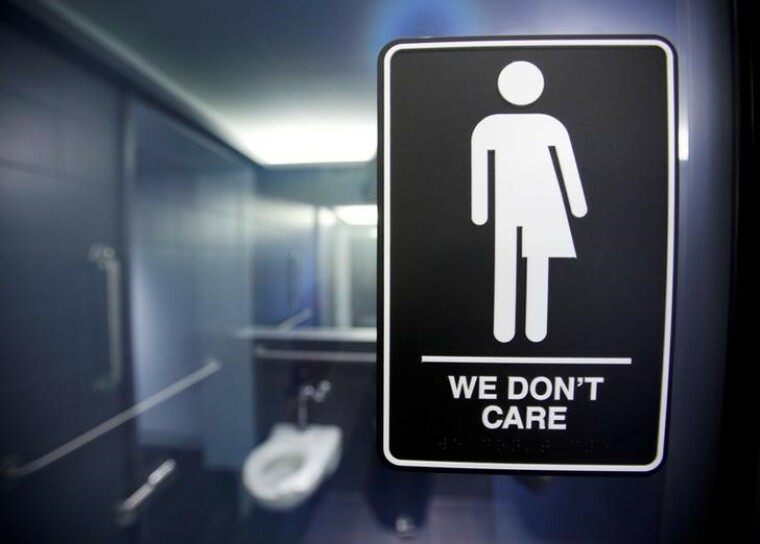10 More states sue Obama administration over transgender bathroom directive
Ten states including Nebraska, Michigan and Ohio sued the Obama administration on Friday, saying the federal government does not have the power to tell states that transgender people must be allowed to use public bathrooms that conform with their gender identity.

The lawsuit, filed in U.S. District Court for the District of Nebraska, takes issue with a May 13 letter sent by the U.S. Department of Justice and U.S. Department of Education to states warning them that they could lose federal funding if they required transgender people to use bathrooms corresponding to their biological sex. The lawsuit says the Obama administration's move was an attempt to rewrite federal civil rights laws that do not apply to transgender people.
It was filed by the attorneys general of the 10 states, which also include Arkansas, Kansas, Montana, North Dakota, South Carolina, South Dakota and Wyoming.
"When a federal agency takes such unilateral action in an attempt to change the meaning of established law, it leaves state and local authorities with no other option than to pursue legal clarity in federal court," Nebraska's attorney general, Doug Peterson, a Republican, said in a statement.
The Justice Department did not immediately have a comment.
The lawsuit is the latest salvo in a nationwide debate over rights for transgender people.
Officials from Texas, Wisconsin and nine other states on May 25 filed a nearly identical lawsuit in federal court in Texas, later joined by Kentucky and Mississippi.
States challenging Obama administration initiatives have frequently filed separate lawsuits making similar claims so the cases ultimately end up in multiple federal appeals courts, increasing the states' chances of victory.
The Obama administration's letter said transgender people are protected by prohibitions on sex discrimination in Title VII of the Civil Rights Act of 1964, which applies to employment, and Title IX of the Education Amendments of 1972, which applies to federally funded schools. States collectively receive billions of dollars in federal education funding each year that can be taken away as a penalty for violating Title IX.
The states that are party to the lawsuit filed in May on Wednesday asked the judge handling that case to temporarily block the administration from enforcing its interpretation of federal law pending the outcome of the lawsuit.
The Justice Department in May sued North Carolina over a state law that requires people to use public bathrooms that correspond to the sex on their birth certificates.
That law has spurred protests by companies, sports leagues and prominent musicians who have refused to play concerts in the state.
 Christians don't have to affirm transgenderism, but they can’t express that view at work: tribunal
Christians don't have to affirm transgenderism, but they can’t express that view at work: tribunal Archaeology discovery: Medieval Christian prayer beads found on Holy Island
Archaeology discovery: Medieval Christian prayer beads found on Holy Island Presbyterian Church in America votes to leave National Association of Evangelicals
Presbyterian Church in America votes to leave National Association of Evangelicals Over 50 killed in 'vile and satanic' attack at Nigerian church on Pentecost Sunday
Over 50 killed in 'vile and satanic' attack at Nigerian church on Pentecost Sunday Ukrainian Orthodox Church severs ties with Moscow over Patriarch Kirill's support for Putin's war
Ukrainian Orthodox Church severs ties with Moscow over Patriarch Kirill's support for Putin's war Islamic State kills 20 Nigerian Christians as revenge for US airstrike
Islamic State kills 20 Nigerian Christians as revenge for US airstrike Man who served 33 years in prison for murder leads inmates to Christ
Man who served 33 years in prison for murder leads inmates to Christ


 Nigerian student beaten to death, body burned over ‘blasphemous’ WhatsApp message
Nigerian student beaten to death, body burned over ‘blasphemous’ WhatsApp message 'A new low': World reacts after Hong Kong arrests 90-year-old Cardinal Joseph Zen
'A new low': World reacts after Hong Kong arrests 90-year-old Cardinal Joseph Zen Iran sentences Christian man to 10 years in prison for hosting house church worship gathering
Iran sentences Christian man to 10 years in prison for hosting house church worship gathering French Guyana: Pastor shot dead, church set on fire after meeting delegation of Evangelicals
French Guyana: Pastor shot dead, church set on fire after meeting delegation of Evangelicals ‘Talking Jesus’ report finds only 6% of UK adults identify as practicing Christians
‘Talking Jesus’ report finds only 6% of UK adults identify as practicing Christians Mission Eurasia ministry center blown up in Ukraine, hundreds of Bibles destroyed: 'God will provide'
Mission Eurasia ministry center blown up in Ukraine, hundreds of Bibles destroyed: 'God will provide' Church holds service for first time after ISIS desecrated it 8 years ago
Church holds service for first time after ISIS desecrated it 8 years ago Burger King apologizes for 'offensive campaign' using Jesus' words at the Last Supper
Burger King apologizes for 'offensive campaign' using Jesus' words at the Last Supper Uganda: Muslims abduct teacher, burn him inside mosque for praying in Christ’s name
Uganda: Muslims abduct teacher, burn him inside mosque for praying in Christ’s name